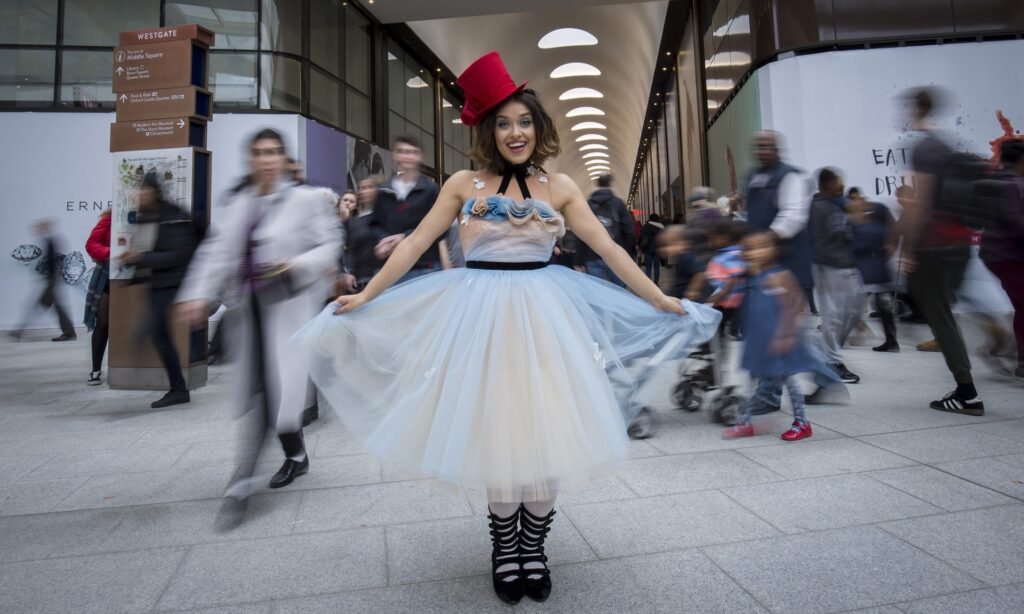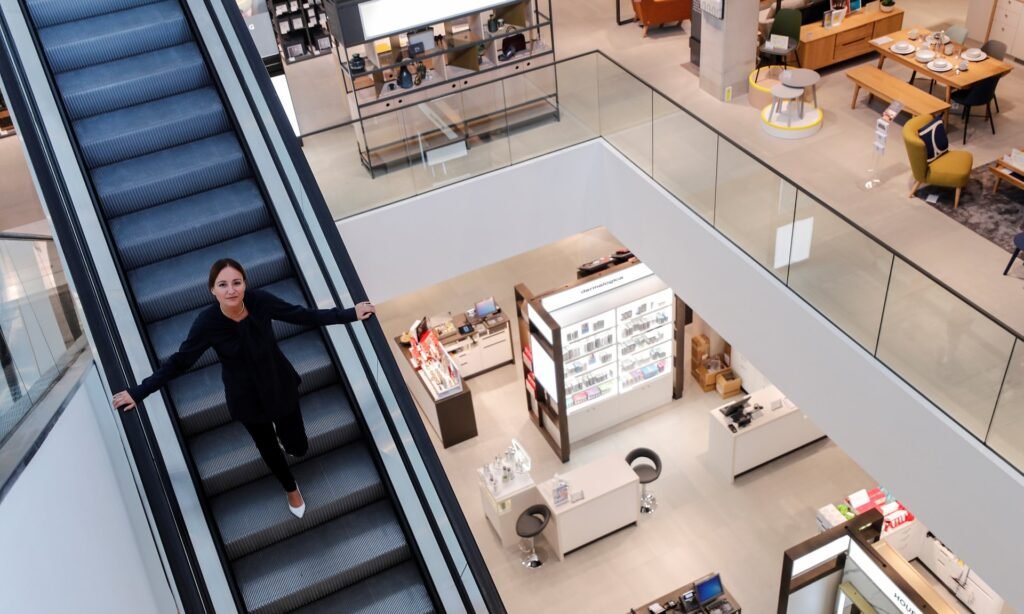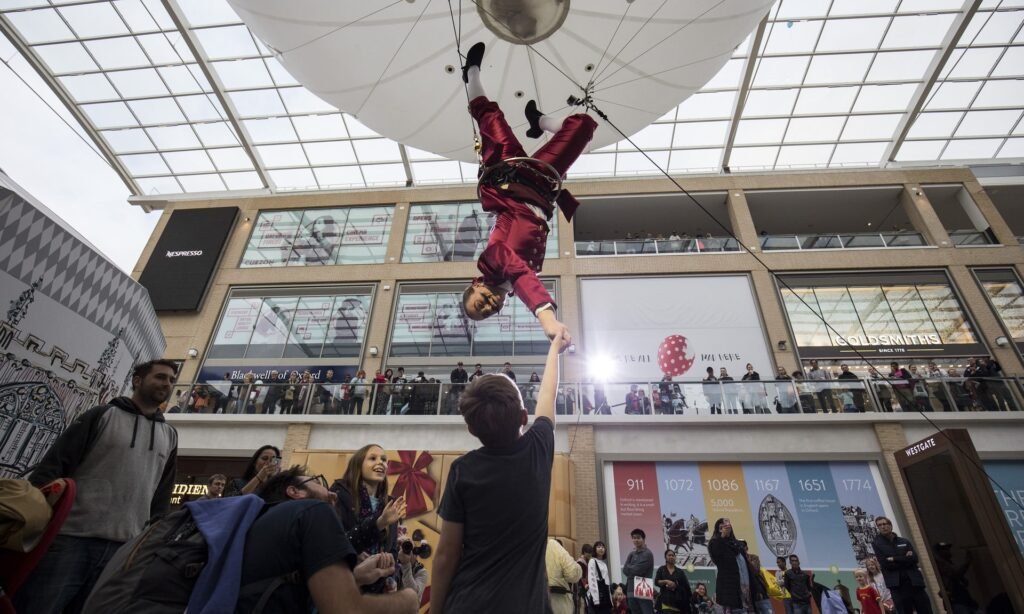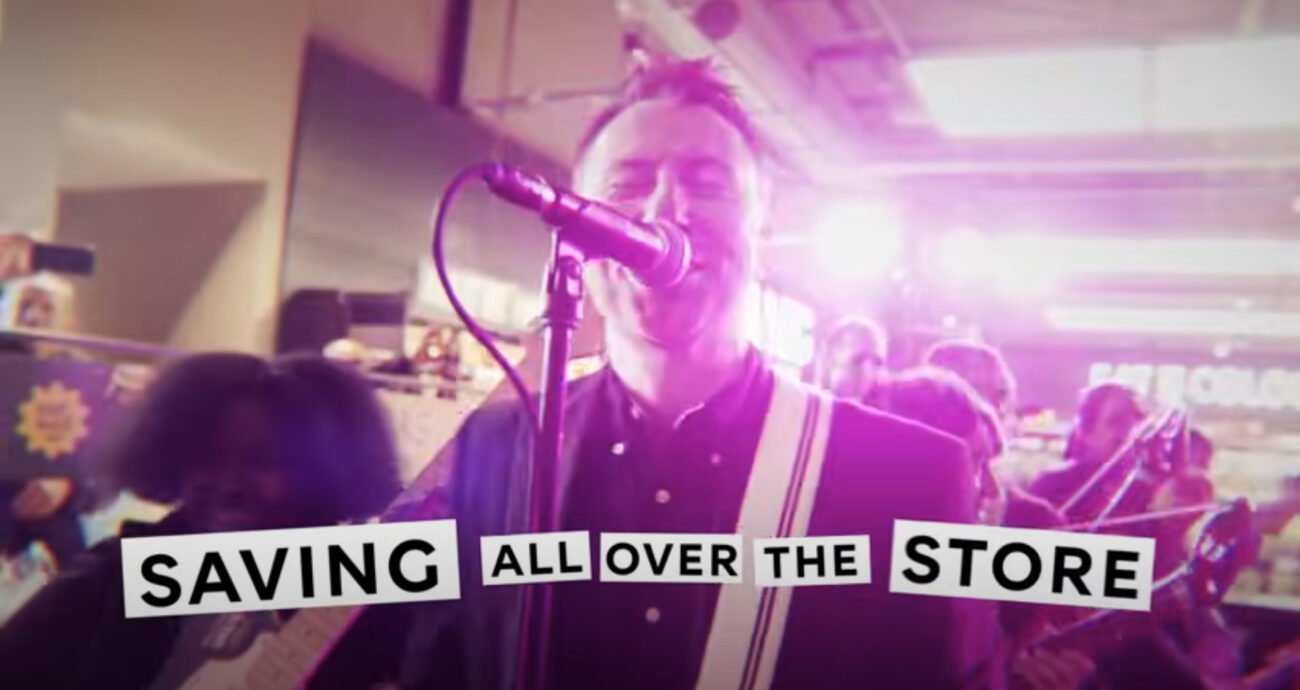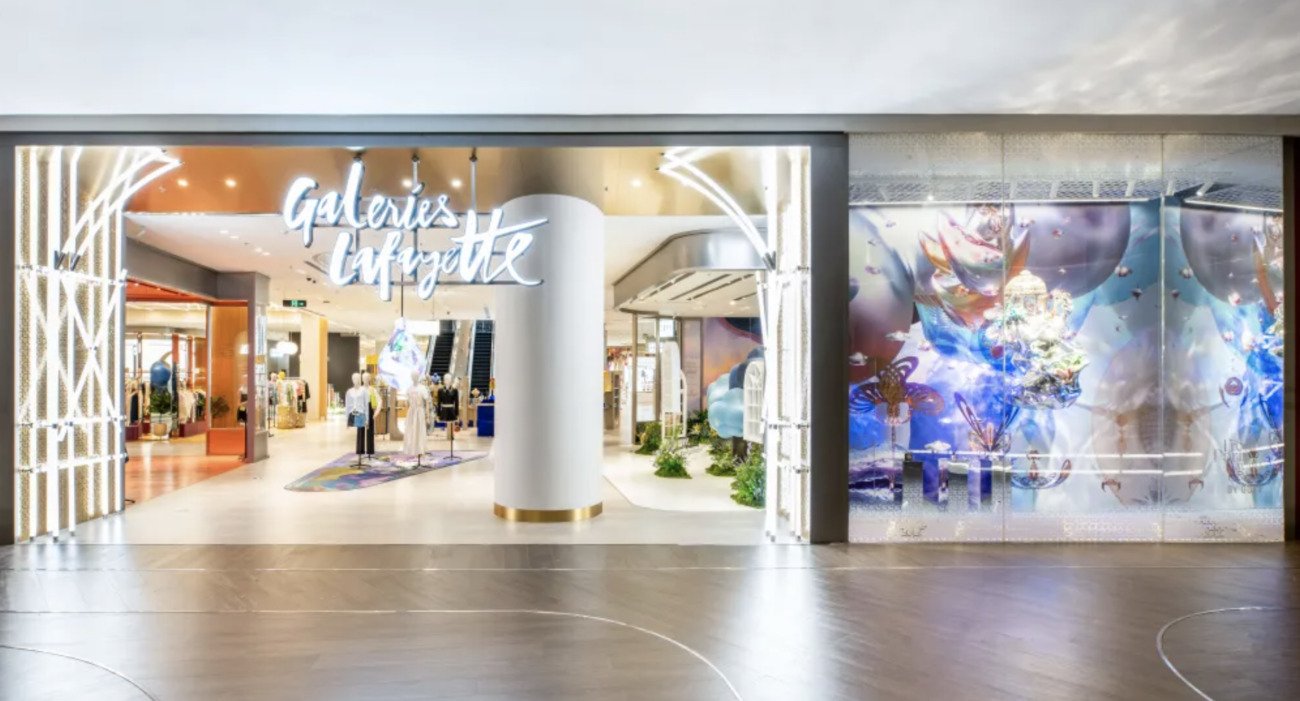Immersive Shoppertainment – The Future Of Commerce
“We are the controllers of the funfair, of the rabbit hole
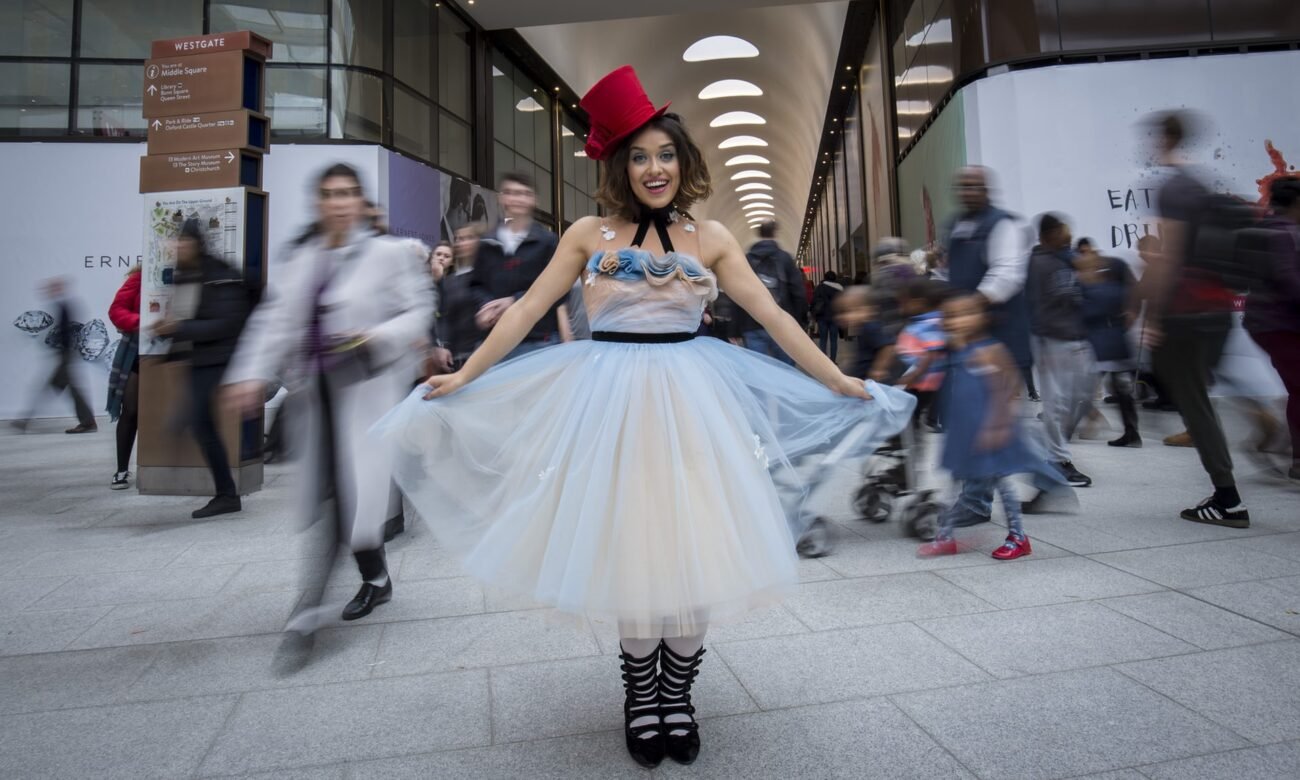
“We are the controllers of the funfair, of the rabbit hole … of the dreams,” cries an eccentrically costumed showman as a three-dimensional kaleidoscope whirls into life.
The ride is one of the Alice’s Adventures in Wonderland-themed theatrical “experiences” designed to inject some pizzazz into the opening of Westgate Oxford, the £440m shopping centre that has replaced the city’s rundown 1970s scheme.
““We are the controllers of the funfair, of the rabbit hole … of the dreams,” resonates an eccentrically costumed showman, setting the stage for an extraordinary narrative. As a three-dimensional kaleidoscope whirs to life, attendees are propelled into the heart of enchanting experiences.
One of these captivating episodes unfolds in the guise of Alice’s Adventures in Wonderland, a theme that infuses whimsicality into the grand unveiling of Westgate Oxford. Replacing the antiquated 1970s complex, this £440 million shopping center has redefined urban shopping. Amid the surreal swirl of colored mirrors on a spinning wall, a sense of delightful vertigo ensues. Exiting this spectacle, you find yourself blinking in the presence of the sprawling John Lewis store, a tangible reminder that this isn’t Wonderland. Instead, you’ve stepped into the realm of “shoppertainment” – a courageous domain where retailers have transcended the conventional to blend commerce with captivating showmanship.”
The more than 300 staff at Westgate’s John Lewis have been put through their paces by the Oxford Playhouse theatre. The acting lessons, which included voice coaching and body language skills, are part of new John Lewis boss Paula Nickolds’ bold plan to “reinvent the department store for the 21st century”.
Simon Tavener, secretary of the Oxford Theatre Guild, says it’s useful for retail staff to find their “character”, adding: “You need to put on a face and adjust your performance to suit [the customers’] needs and wants.
‘‘Selling requires you to have a sort of script in your head,” Tavener says. “Not one you recite, but one you tailor to your own voice … a form of improv, if you like.”
John Lewis’s new Oxford shop is “more than a route to selling things”, according to Nickolds, who has turned over a fifth of the 120,000 sq ft selling space to 21 “services and experiences”, ranging from style advice to personalised Christmas baubles. The retail theatre is stage-managed via an “experience desk” where shoppers can plan their itinerary. One option packs personal shopping, a manicure, a light lunch at Benugo and a Charlotte Tilbury makeover into a five-hour spree. Given the store’s £18m cost, the last entry on the agenda is, of course, “Head to customer collections to collect your purchases”.
Shoppers hungry for experiences have plenty of other options. In the nearby Nespresso store, fans of its pod coffee machines are invited to sit down and literally smell the coffee. Staff are coffee specialists who deliver the “ultimate coffee experience”, and the store’s props include an atelier table where shoppers can take masterclasses.
Westgate Oxford took nearly 20 years and three sets of developers to complete, despite the fact that major retailers were desperate for modern units rather than the more traditional style of shop the historic centre of Oxford is famous for. The 800,000 sq ft mall, a joint venture between Landsec and the Crown Estate, is now 93% let.
Despite the uncertainty created by Brexit, Landsec’s Scott Parsons says there was still plenty of interest from retailers. But he admits that “getting some deals across the line took a bit more time. Retailers were being a bit more cautious and going back to their boards for approval.”
On Thursday, the CBI’s monthly retail survey provided a grim snapshot of high street trading, with sales falling at their fastest rate since the height of the financial crisis. On the same day, Debenhams reported a 44% slide in pre-tax profits to £59m, dragged down by £36.2m of exceptionals as it marked down the value of its worst performing stores.
All the major department store chains are trying to give their stores a raison d’être in the internet age. Retail theatre was pioneered by famous London department stores such as Selfridges, although its efforts reached parody levels earlier this year when it ran potato peeling workshops to help stressed-out consumers “reconnect” with themselves.
Bucher is also trying to inject some showbiz into stores via X Factor-style auditions for staff at Debenhams’ recently opened retail park store in Stevenage, Hertfordshire. The shop’s stock room is known as “backstage” and a sign by the door leading to the shop floor says “Smile, you are on”. “We want to have people on the sales floor who love working there,” says Bucher. “We don’t want to harass customers, but want to be part of this fun activity called shopping.”
The GlobalData analyst Maureen Hinton says these store investment programmes are a bet on the experience economy as Britons spend more on leisure, travel and entertainment pursuits.
“The beauty industry is also benefiting from consumers’ greater interest in how they look – you’ve got to look good in selfies – as well as health and wellbeing,” she says. “This is a way of tapping into that and getting them to come to your store and hopefully spend on other products. However, I do wonder how profitable this is for retailers.
“In a way, department stores are returning to the old version of themselves, where you could go to a hair salon, beauty room and the restaurant and have stuff delivered to your home,” adds Hinton. “This is what the original Selfridges, Harrods, and probably Dickins & Jones were like.”
Back in John Lewis’s Christmas shop, Joyce is deciding whether to splash out on an £8 plastic unicorn for her tree. She is steering clear of the experience desk, but has already bought an oven and a laptop, persuaded by the chain’s “never knowingly undersold” pledge. With a tight budget, she has no plans to splash out on a beauty treatment. “Oh, no,” she says. “I only buy cheap Rimmels in Superdrug.”
But downstairs, a row of women with beatific expressions on their faces are having their nails buffed and polished in full view of passing shoppers. One is sipping prosecco. They are living the 21st-century department store dream.
Via The Guardian
 English
English


